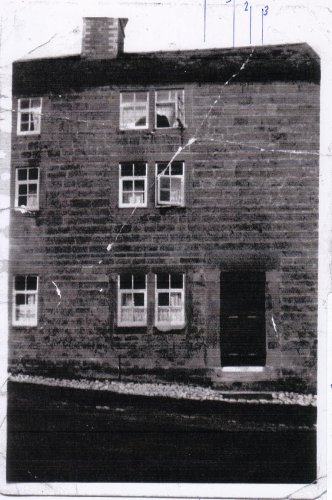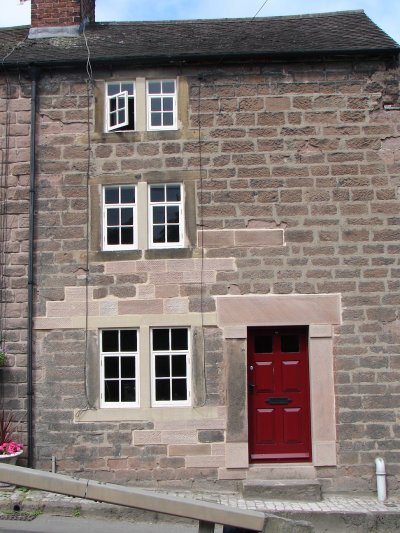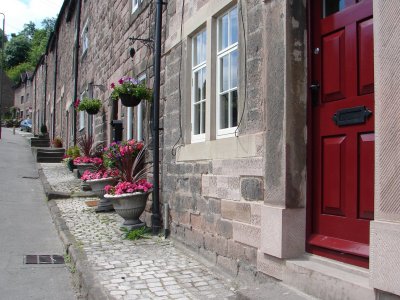
George O'Shaughnessy mailed this photo and says: [More information can be found in An Autobiography] Whilst I was born in June of 1926 I remember nothing of my early time at Normanton and my first memories are of Cromford. I must have been around two years old when the rest of the family moved to Cromford. Dad had arrived some time earlier and was in lodgings with an elderly couple, Mr and Mrs Marples of Rise End Middleton. My first recollections were of our house at Addison Square half way up the main part of Cromford Hill on the route to Wirksworth. It was, I believe, a council house of fairly recent construction and had a reasonable amount of garden for the area. We were destined not to occupy that house for long and within months we had moved to No 54 The Hill, Cromford, only a hundred yards or so higher up the hill. It was cheaper and although may not have been as large as the earlier house, it was three storied and possibly had the odd room extra which was more suited to a large family. There was no running water laid on, lighting was by gas and cooking had to be done over a coal fired range which had an oven and a tank for heating water on the opposite side to the oven. There was a drain but no toilet sanitation except for the outside closet at the bottom of the small yard. Cold water was only available from a tap across the road from the house. In the small ‘kitchen’ there was a large half circle copper under which a fire had to be lit every Monday morning as washing was not done on any other day in those times, water was carried across the road and then all the clothes were boiled. It was quite a ritual for a small boy, then the drying and ironing had to be done. Please notice the whiteness of the front step!! My mother used to holystone that every Saturday morning without fail, rain or shine or snow, we kids, five of us (at that time) were kicked out to play while she cleaned all Saturday morning. ...you will find four holes in the wall. Three in a triangle shape in the area just above the front door and the fourth just to the right of the centre of the middle window. ...the drilled holes (all you will notice are through the mortar lines and not the stone) are exactly located to support a sign with a longer steadying bar. I understand ...the house [opposite] used to be a Public House. What did our house use to be?
Dates:
Click on photo for enlargement (on CD only)
Have any more information about this photo? Please e-mail
the author on: |
 View up Cromford Hill from number 58 in 2007.
View up Cromford Hill from number 58 in 2007. Maureen Griffith writes:
Maureen Griffith writes:
Well it's been a long trail, but at last "by George(O'Shaughnessy)" we've got it! George's 54 The Hill, is now 58 The Hill, (and has been recently renovated, helped by English Heritage funding). The number changes happened in 1965, (more about this to follow)..... However this puzzlement did drive me to the electoral registers, District Council minutes, Local Studies, and I know without a doubt that George's 54 The Hill is now call 58. To establish the new number, I made charts of the numbers and occupants on the Hill, for 1934 - I used the electoral registers. I cross-referenced these through from 1934 to 1980. The only change came in 1965. This was recorded also in the District council minutes, (but the actual plan had long since disappeared). It was clear that numbers had advanced by three, this would have made number 56 into 60, but visually it wasn't. Eventually after much puzzling and staring at the houses, (it's a wonder I wasn't arrested!)- I realised there was no 56. Breakthrough. New numbers 54 & 56 had combined into one dwelling called 54 and number 56 was no more! and still isn't. Thus the numeration for old 54, increased by 2, and it became 58. It still is. One of the following residents of old 54 was called Dickinson, he continued in the registers after his house became 58.He was still there ten years ago. I spoke to the lady at no 60, and indeed she remembered him, at no 58, as her neighbour. There is a drain cover outside no 58, George mentioned this, there is also the hydrant (tap) remains opposite. A nearby Pub was demolished in the seventies. The Hill that George remembered is no longer there, quarried away There is more evidence, but thats it for now.
By the way, I managed to find an email address for George O'Shaughnessy,
and sent an email asking him if old #54 was a corner site, but have had
no reply yet. (George, if you read this, please email me on
|
